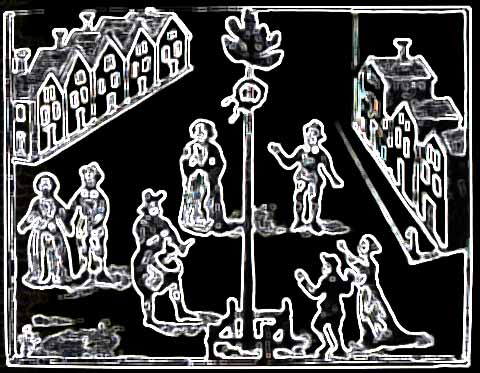|
Research indicates that
these MacThoys were a good deal more
feral than their ancestors. To add to the Puritan
ire, the MacThoys managed an even better
relationship with the Indians and spent
their time on beer making and larking about. Hawthorne's
description continues:
In the quietest times, they
sang ballads and told tales for the edification of their pious
visitors; or perplexed them with juggling tricks; or grinned at them
through horse collars; and when sport itself grew wearisome, they made
game of their own stupidity and began a yawning match
The MacThoys
introduced the Mayday celebrations to the New
World. It being part of their time honored traditions that
every Clan gathering have either a wedding
or a funeral. Hawthorne again:
This wedlock was more serious
than most affairs of Merry Mount, where jest and delusion, trick and
fantasy, kept up a continual carnival. The Lord and Lady of the
May, though their titles must be laid down at sunset, were the same
bright eve.
The Maypole
celebration was more than the Plymouth Puritans could
stand. In New Canaan, Morton
continues the tale:
The setting up of this
Maypole was a lamentable spectacle to the precise seperatists : that
lived at new Plymouth. They termed it an Idoll; yea they called
it the Calf of Horeb: . . .; threatening to make it a woefull mount and
not a merry
mount. . .

Depiction of Maypole
in town center. -- ed.
Miles
Standish led the Puritans in an
attack on Merry
Mount. They captured Morton
and shipped him
back to England. The MacThoys
were sorry to see him leave. Some left the colony but a few stayed
on to mind the beer they had made. The colony continued on for
several years when Morton rejoined them
again. It didn't take him long to rile the Governor of the Massachusetts
Bay Colony.
The Governor arrested him,
chopped down the maypole and burnt Morton's house. This story
is recounted in Hawthorne's The May-pole of Merry Mount.
|